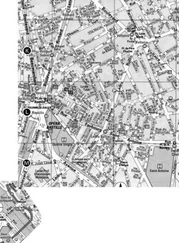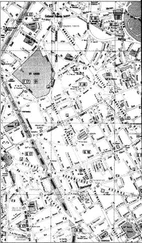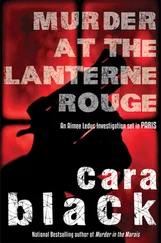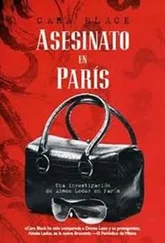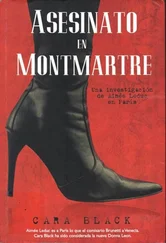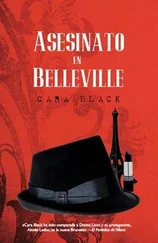EARLY EVENING quiet had descended over the shadowy, intimate, crescent-shaped square near Clichy. Strains of an accordion mingling with a guitar wafted from somewhere above her. Familiar, an old working-class song her grandmother had played. Aimée looked up to see the silhouette of a couple dancing behind a lighted window.
And for a moment, she forgot the drizzle on the pavement and it could have been the countryside. Low stone buildings, a cat slinking around the corner, the church clock pealing the hour. But she couldn’t get away from the awful sound in her head of the bullets’ ricocheting by the phone cabinet where Thadée had been shot. The sickening scene replayed over and over.
Why kill Thadée?
If she couldn’t meet the kidnappers’ demand, René would be next. She looked at her watch . . . already an hour had passed! She willed her fear down; it wouldn’t help her find René.
She remembered the door closing yesterday in the Olf office foyer, her frisson of fear. If she’d been the target and escaped, and now they’d gone for René, it was her fault.
Darkness blanketed the narrow street, the furred glow of dim streetlights the only illumination.
She had to find Sophie, the woman Thadée had named with almost his last breath, his ex-wife. She had to try to figure out where Thadée had gotten the jade—and who might have it now.
She walked past the glass awning to the rear of the courtyard. Under the stone lintel, by an ancient water spigot, a nicked metal sign in old formal French forbade children to play in the courtyard. She wondered when was the last time any children had lived here.
She passed the back stairs, wrapped her scarf around her head, belted her shearling coat tighter, and thanked God she’d worn her good boots. Only a three-inch heel.
Adjoining the old tire factory, beyond the fence, she saw an eighteenth-century limestone townhouse. Preserved, with an air of neglect at the edges. Was this where Thadée had lived? She hit the two buzzers. No answer. Only darkened windows.
Galerie 591 was locked. But a dim light shone through the mottled glass. She called the gallery telephone number. The phone rang and rang.
Aimée knocked on the service door. No answer. Looking in the window, she saw a dimly lit office with state of the art computers on several desks. Beyond lay a room with metal sculptures and paintings strewn across the floor. Curtains blew from an open hall window. Glass shards sparkled on the floor.
Someone had broken in.
She turned the knob of the door. Locked. She pulled out her lock-picking kit, inserted a thin metal skewer into the bronze cylinder-like Fichet lock. A few turns and she heard the tumble of the chamber and the lock snapped open.
Inside, a 1920s-style lamp with beaded fringe cast a reddish glow over the gallery.
“. . . Ohé , someone here?”
She caught a faint whiff of classic Arpège emanating from a damp sweater flung over a chair.
Glancing out the open window overlooking the adjoining townhouse, Aimée saw a woman going out the door. In the glare of the streetlight, this woman, a pint-size Venus, was applying lipstick as she crossed the desolate square, her heels clicking on the cobbles. She wore a vintage mini-dress over beat-up jeans. A chic, downplayed look.
A chainsmoking, Vespa-riding thirty-something man puttered by, idled the engine, and stopped. Aimée noted the woman’s black hair with purple braids. Could she be Asian? But her face was turned and it was too far away to tell. After exchanging a few words, she swung her leg over the man’s Vespa and they rode away.
Aimée chewed her lip and listened. She pulled out her penlight and shone the beam on the wood floor.
“Sophie Baret?” she called out.
The only response was the rushing of water and creakings of the old warehouse mingling with the flushing of pipes and the sound of water from the roof gutters hitting the street.
Flushing? Or something else? The sound of water in the background continued.
She crouched, grabbing what seemed to be a shovel leaning against the showcase. She realized it was an artwork inlaid with a mosaic of blue glass and ceramic tile tesserae. A fairy dust-like glitter sparkled as she carried it. Making hard contact was all she cared about. The floorboards creaked. Dampness permeated her bones and she shivered.
As she kept walking, the sound of gushing water grew louder. Inside a dank hallway lined by old showcases from thirties millinery stores, lay more objets d’art : sculptures and installation pieces. Aimée recognized several of the artists from the current art scene. An older Jean Basquiat painting hung on the wall.
The dim, gray streetlight worked its way through the grime-encrusted windows. Aimée heard a tapping noise.
By the time she reached the rear bathroom, her boots were soaked. She raised the shovel as a weapon and opened the door. A rush of water streamed over her feet.
She gasped. A woman, tied by her scarf to the snaking water pipes of the Turkish style squat toilet, her body oddly twisted, writhed and kicked. Her brown knee-high leather boots beat a pattern on the dirty tiled floor. Only the whites of her eyes showed. Her eyes had rolled up in her head.
Aimée rushed to lift her up, loosening the scarf from her neck and shoulders. Had she been tied up, tried twisting to free herself, but enmeshed herself further?
As the handle was released, the water slowed to a trickle. But the woman’s flailing arms knocked Aimée into the mirror. It shattered, splintering. Bits of glass studded Aimée’s coat.
“Killer!” the woman screamed.
“Wait a minute,” Aimée said. “I’m trying to help you! You’re Sophie? Thadée’s . . . ?”
Aimée ducked as the woman swung a fist at her, then slipped, her head hitting the tiles with a loud crack. Her body slackened and went limp.
Filled with panic, Aimée listened for the woman’s shallow, irregular breaths. She moaned and struggled against Aimée.
Somehow Aimée dragged her out of the bathroom and propped her against an old counter top. Thuds and noises came from the floor above them, then there was a clatter on the stairway. Her heart skipped. Was someone coming back to finish Sophie off?
Wednesday Night
NADÈGE PULLED DOWN HER sleeves, took a breath, and entered her father’s mansion facing the Parc Monceau. She had to explain to him about Thadée; she needed his help. She could hear her father’s reply ‘He’s always in trouble . . . like you.’ True. But Thadée was still his brother-in-law, wasn’t he? Her tante Pascale’s ex, it’s true, yet part of the family. And there was a lot more to it.
The uniformed butler stood aside, letting her ascend the marble staircase lined with hanging tapestries. She grabbed the handrail to steady herself. Her spike heels clattered above the noise of the reception; conversations, tinkling of glasses and the strains of a baroque chamber music ensemble.
The usual.
Her petite great-grandmother , tottering on her bound feet in their tiny embroidered shoes, had told her when she was small, “You are of the Lang-shun princess blood line. There’s royal blood in your veins.” Right now there was a lot more than that in them.
With Chinese and Vietnamese heritage on her mother Phuong’s side, French on her father’s, Nadège had been termed l’asiatique behind her back at school. Her mother had died when she was four. Nadège had been raised by her grandmother, the first in her generation not to have bound feet.
She found her little boy, Michel, asleep in the black lacquer bed, grand-mère’s marriage bed. A tart odor of incense surrounded him and the faint, suffused red light from the small altar in the corner gave a blush to his cheeks. Against the wall, a Chinese chest held linens and his tumbled treasures of Legos and wooden blocks.
Читать дальше


